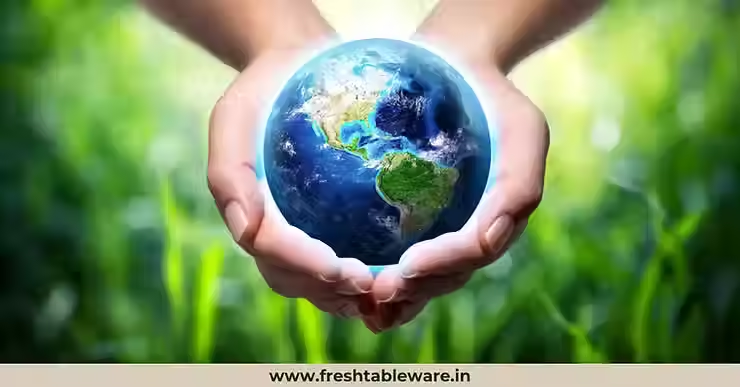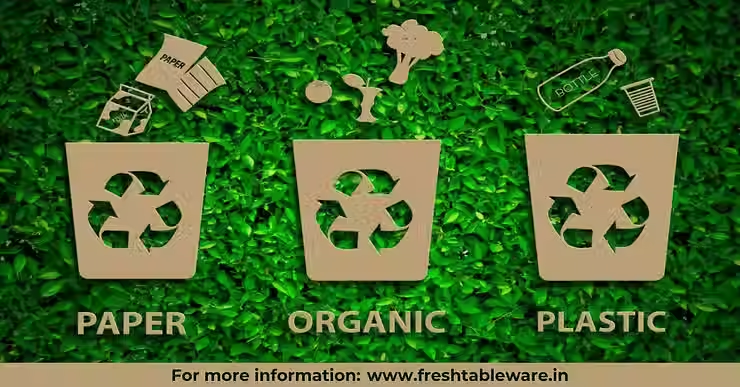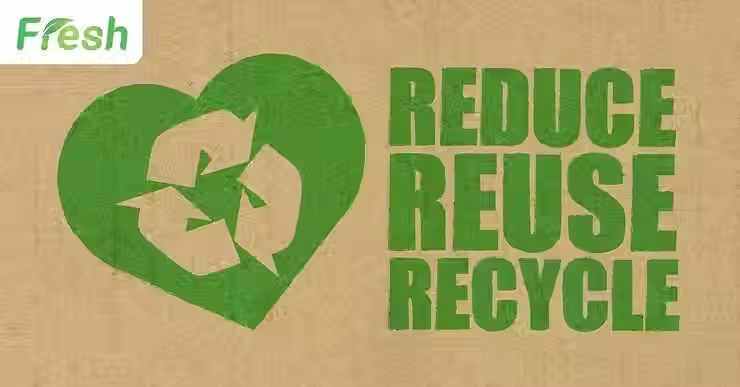Guide to a Sustainable Lifestyle & 21 Eco-Friendly Habits in 2026
- Jan 6
- 6 min read

Living a sustainable lifestyle for the environment means making conscious choices that reduce our ecological footprint and help preserve natural resources. From minimizing waste to using biodegradable products, adopting sustainable habits is crucial for a healthier planet. At Fresh Tableware, we are committed to sustainability by providing eco-friendly, biodegradable tableware that helps people make responsible choices in their daily lives.
What is a Sustainable Lifestyle?
A sustainable lifestyle means living in harmony with nature, consuming resources responsibly, and reducing your ecological footprint. It’s about making conscious decisions-from what you eat, wear, and use to how you travel and manage waste.
The essence of sustainability lies in one simple truth: the choices we make daily shape the future of our planet.
Why Sustainable Living Matters in 2026?
The year 2026 marks a turning point for global sustainability. With climate change, pollution, and waste generation at critical levels, adopting eco-friendly habits is no longer a choice-it’s a necessity. A sustainable lifestyle doesn’t mean sacrificing comfort; instead, it’s about making smarter choices that benefit both you and the planet.
This guide brings together practical eco-friendly habits, zero-waste tips, and future trends, offering you a roadmap to live greener in 2026 and beyond.
The World Health Organization (WHO) warns:
“Climate change presents a fundamental threat to human health … increasing the risk of deaths, noncommunicable diseases and creating severe stress on healthcare systems.” (WHO)
In India’s Economic Survey 2023-24, the government stated:
“Mission LiFE focuses on human-nature harmony promoting mindful consumption than overconsumption that lies at the root of global climate change problem.” (PIB India)
Prime Minister Narendra Modi echoed the same, saying:
“Mission LiFE believes that environment can be protected by changing your lifestyle.” (Hindustan Times)
And UN Secretary-General António Guterres has emphasized:
“Making Peace with Nature is the Defining Task of the 21st Century.” (UNFCCC)
These voices - from governments, health organizations, and world leaders - highlight one truth: every small change we make in our daily lives adds up to a massive global impact.
Why is Sustainability Important?

Sustainability is the foundation of a thriving future. It ensures that we meet our present needs without compromising the ability of future generations to meet theirs. The depletion of natural resources, excessive plastic waste, and environmental pollution highlight the urgent need for sustainable practices.
Importance of sustainability includes:
Reducing pollution and carbon emissions.
Protecting wildlife and marine ecosystems from plastic waste.
Conserving natural resources for future generations.
Promoting healthier living conditions by minimizing toxic waste.
Businesses and individuals both play a role in building a sustainable future. At Fresh Tableware, we contribute by manufacturing biodegradable plates, bowls, clamshells, meal trays, and glasses-offering an eco-friendly alternative to plastic disposables.
21 Eco-Friendly Habits for Everyday Life

Here are 21 realistic yet powerful ways to embrace sustainability in your daily routine.
1. Embrace the 3Rs: Reduce, Reuse, Recycle
Before buying anything new, ask yourself: Can I reduce my need for it? Can I reuse something instead? Can it be recycled? This mindset alone can cut waste by half.
2. Switch to Reusable Bags & Containers
Carry a reusable bottle, cloth bags, and stainless-steel containers. Avoid single-use plastics like straws, cutlery, and cups. These small swaps save money, cut pollution, and protect oceans.
3. Adopt Minimalist Shopping
Choose quality over quantity. Avoid impulse buying and focus only on essentials. Minimalism reduces waste, saves money, and creates a clutter-free lifestyle aligned with sustainability.
4. Choose Plant-Based or Organic Foods
Eating more plant-based meals reduces carbon emissions. Organic farming methods preserve soil health, minimize chemical use, and support biodiversity while offering fresh, healthier food options.
5. Compost Your Food Waste
Turn kitchen scraps into compost instead of sending them to landfills. Composting reduces methane emissions and provides natural fertilizer for gardens and plants.
6. Say No to Single-Use Plastics
Reduce carbon emissions by cycling, carpooling, walking, or using public transport. These alternatives improve air quality, save fuel costs, and ease traffic congestion.
7. Use Public Transport, Carpool, or Cycle
Switch off unused lights, unplug electronics, and replace outdated appliances with energy-efficient versions. Small actions like LED lighting and smart thermostats lower energy bills and emissions.
8. Use Cloth Towels & Napkins
Replace disposable tissues with washable cloth towels and napkins. This small lifestyle change significantly reduces paper waste and saves money over time.
9. Harvest Rainwater & Conserve Water by Reducing Water Usage
Install simple rainwater harvesting systems and use low-flow taps to save water. Be mindful of how much water you use by fixing leaks, taking shorter showers, and turning off taps when not in use. Conserving water helps reduce strain on natural water resources.
10. Support Sustainable Brands
Buy from companies committed to eco-friendly packaging, ethical sourcing, and fair trade practices. Supporting such businesses promotes green innovation and reduces environmental impact.
11. Switch to Eco-Friendly Tableware
Ditch disposable plastics for bagasse, bamboo, or edible cutlery. Compostable tableware prevents plastic waste, reduces landfill pressure, and supports circular economy practices.
12. Try a Zero-Waste Kitchen
Shop in bulk, store food in glass jars, and avoid cling film. These practices minimize plastic waste, lower food costs, and keep your kitchen sustainable.
13. Buy Second-Hand or Thrift
Fast fashion harms the planet. Choose thrifted or pre-owned items to extend product life cycles, save resources, and reduce textile waste entering landfills.
14. Reduce Digital Carbon Footprint
Emails, streaming, and storage consume energy. Regularly clean inboxes, unsubscribe from newsletters, and store only necessary files to lower your hidden environmental footprint.
15. Go Paperless Whenever Possible
Opt for e-receipts, digital banking, and online documents. This simple switch saves trees, reduces clutter, and makes managing information easier and more sustainable.
16. Switch to Renewable Energy Sources & Use Energy-efficient Appliances
If possible, install solar panels or subscribe to renewable energy providers. Switch to energy-efficient appliances like LED bulbs, low-energy fridges, and smart thermostats. These devices consume less energy, helping to lower electricity bills and reduce your carbon footprint.
17. Grow Your Own Food or Herbs
Even small balcony gardens with herbs and vegetables reduce packaging waste, lower transport emissions, and connect you with sustainable, homegrown food sources.
18. Donate & Share Instead of Discarding
Instead of discarding clothes, furniture, or electronics, donate or share them. This reduces waste, supports communities in need, and promotes mindful consumption.
19. Adopt Eco-Friendly Festival Celebrations
Choose natural colors, biodegradable décor, and reusable items during festivals. Eco-friendly celebrations preserve traditions while lowering environmental impact.
20. Encourage Sustainable Habits at Work
Promote paperless offices, recycling bins, and energy-saving lights. Workplace sustainability encourages teamwork while lowering operational costs and carbon footprints.
21. Teach Kids About Green Living
Involve children in gardening, recycling, and eco-friendly habits. Educating them early ensures future generations continue protecting the planet with conscious choices.
Zero-Waste Lifestyle: Living With Less, Living Better

A zero-waste lifestyle means striving to send as little waste as possible to landfills. In 2026, more households are adopting this philosophy by focusing on reusables, bulk shopping, and composting.
The Principles of Zero-Waste Living
Refuse what you don’t need.
Reduce what you do need.
Reuse what you can.
Recycle what you can’t refuse or reuse.
Rot (compost) organic matter.
Practical Zero-Waste Swaps for 2026
Plastic bottles: Refillable stainless steel bottles
Cling film: Beeswax wraps
Disposable tableware: Bagasse or bamboo alternatives
Coffee pods: French press or refillable capsules
The Future of Eco-Friendly Living
Sustainable living in 2026 is fueled by innovation, technology, and community efforts.
Sustainable Trends to Watch in 2026
Growth of circular economy businesses
Rise of biodegradable packaging
Sustainable fashion taking center stage
Smart homes with energy-saving systems
Technology & Innovation Supporting Green Living
AI-powered smart energy monitoring
Bioplastics replacing traditional plastics
Vertical farming reducing land use
Fresh Tableware: Your Partner in Sustainability

At Fresh Tableware, we are proud to be one of the largest biodegradable product manufacturers in India, located at CE - E - 43/1, 91springboard, Okhla Phase II, New Delhi, India – 110020. Our range of eco-friendly products includes:
Biodegradable Plates – Perfect for meals, catering, and events.
Bowls & Bowls with Lid – Ideal for serving soups, curries, and desserts.
Clamshells – A sustainable choice for takeaways and food packaging.
Meal Trays – A convenient, eco-friendly solution for meal serving.
Glasses (Cups) – Compostable drinkware for a greener future.
By choosing our biodegradable products, individuals and businesses can actively contribute to a sustainable lifestyle for the environment while still enjoying convenience and functionality.
FAQs About Sustainable Living in 2026
Q1: Is sustainable living expensive?
Ans: Not necessarily. In fact, habits like reusing, composting, and conserving energy save money long term.
Q2: How can I start living sustainably if I’m a beginner?
Ans: Start small: carry a reusable bag, switch off unused lights, and reduce single-use plastics.
Q3: What’s the difference between zero-waste and sustainable living?
Ans: Zero-waste focuses mainly on reducing physical waste, while sustainable living covers energy, water, food, and lifestyle choices.
Q4: Can one person’s eco-friendly habits really make a difference?
Ans: Yes. Small changes multiplied by millions of people create massive environmental impact.
Q5: What are the easiest eco-friendly swaps in 2026?
Ans: Reusable bottles, cloth bags, composting bins, and switching to LED bulbs are the simplest.
Q6: What’s the biggest sustainability challenge in 2026?
Ans: Plastic pollution and climate change remain top concerns, but innovations in biodegradable materials are promising solutions.
Conclusion: Small Steps, Big Impact
Living sustainably in 2026 isn’t about perfection-it’s about progress. Every habit, whether refusing a plastic straw or installing solar panels, adds up to a healthier planet. By adopting these eco-friendly habits, you’re not only shaping a greener lifestyle for yourself but also inspiring others to follow.
You May Also Like to Know:



